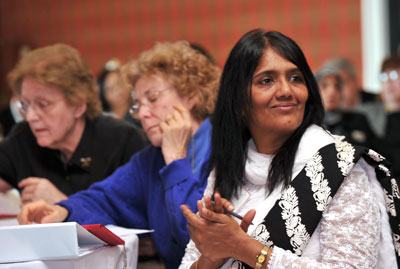WCMC-Q Joins NY in Curriculum Reform Discussion
February, 2011

WCMC-Q faculty participate in curriculum reform retreat, left to right:
Mary Anne Baker, Ph.D., Dr. Marcellina Mian, Dr. Rachel Koshi.
WCMC-Q faculty, staff and students stepped away from the campus Saturday to take an objective look at the curriculum and possible ways to make it better.
The scrutiny coincides with similar work underway at Weill Cornell Medical College in New York.
“This is a day for us to think about where we have been, what we are doing right now, and what we could be doing in the future,” said Dr. Lyuba Konopasek, associate dean for medical education, who organized the the day-long retreat on curriculum reform. “Our curriculum is not merely a set of learning objectives for our students, it is the golden thread that helps to define us as a community of teachers and learners. It is something we experience and share as well as the tool we use to create outstanding physicians of the future,” added Dr. Konopasek. “If two heads are better than one, then we have just added 65 heads to the conversation taking place in New York.”
“Why curricular reform now? Because the time is right,” said Dr. Carol Storey-Johnson, senior associate dean for Education at Weill Cornell Medical College who attended the day-long retreat and described the reform effort underway in New York.
The conversation began last year, after the medical college received accreditation for eight years and the Carnegie Foundation for the Advancement of Teaching released its call for reform of medical education. Another impetus for the discussion is the challenge posed by the creation of new medical schools. “Ten years ago, there were about 125 medical schools. Now they number about 133. They have the advantage of creating their curriculum instead of inheriting it. We need to stay competitive and figure out how we can we can transform our traditional structure to meet new challenges,” said Dr. Storey- Johnson.
The last major transformation of medical schools followed the release in 1910 of another report by the Carnegie Foundation. Based on the recommendations by Abraham Flexner in that report, medical schools transformed from largely unregulated, for-profit schools into the university-based system that exists today. It was the Flexner report that established two years of basic sciences followed by two years of clinical skills as the model for most medical schools.
The 2010 report by the Carnegie Foundation includes the following key findings:
•standardize learning outcomes and individualize the learning process
•integrate formal learning with clinical experience
•develop habits of inquiry and improvement into medical education at all levels
•focus on the progressive formation of professional identity
“There is very little room in our current curriculum for individualized learning, and there is not much time for mentoring,” said Dr. Storey-Johnson. “The point is to create a curriculum that would welcome students’ interests so they can get their core competencies while exploring areas that interest them.”
To consider reforms in line with the findings, Weill Cornell Medical College established a new education committee to work with the dean and faculty to make recommendations about possible changes to the curriculum and their implementation.
At the retreat, WCMC-Q faculty, staff, and students broke into small groups to discuss different elements of the curriculum and make recommendations about areas that work well and those that could be improved.
“The most important message I bring is about our interest in engaging you to help us with our curriculum reform. I cannot tell you how much we have learned from you about how we need to be flexible about curriculum and context,” said Dr. Storey-Johnson.”
Collaborations between faculty in Doha and New York will continue to address common curricular themes and focus on curricular topics specific to the needs of the region, said Dr. Konopasek.
